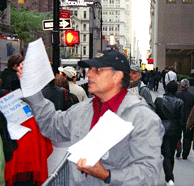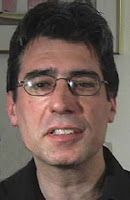
New York Immigration Coalition Panel
Oversight Hearings on the DOE's Small Schools Initiative
New York City Council Education Committee
February 16, 2007
Good morning. I'm John Lawhead and I'm a teacher of English as a Second Language at Samuel J. Tilden High School in East Flatbush, Brooklyn. I've been a teacher in city high schools for eleven years. I want to thank Chairman Jackson for holding these hearings and the New York Immigration Coalition for inviting me to join their panel. I'm here to discuss how immigrant teenagers in my school community are being affected by the Department of Education's small schools initiative.
Tilden has a large population of recently arrived immigrants. We have students from Latin American, the West Indies and West Africa. The vast majority of the students in our school who are learning English come from Haiti. In the months since the current school year began Tilden has taken in between 75 and 80 teenagers newly arrived in the country. In school jargon they are called “over the counter” students. A major part of my teaching schedule is spent with these students.
A couple of days ago at the start of one of my afternoon classes I observed a group of Haitian students standing by a window. They were completely entranced as they watched snow falling into the street outside. Their sheer awe and the silence in which they stood watching the event amused me and I started to joke about their innocence. One boy protested, stepped away from his classmates, and said that he'd already seen snow -- sometime last week.
Yesterday the mood had changed. The students were sullen about the weather. They were surprised at how quickly the snow had turned hard and ugly. There was even the sense of a general disaster. During the morning, Nancy and Jude, a brother and sister in the same class, arrived very late and out of breath. There were wearing visitors' badges from Kings County Hospital. Their mother had left for work early yesterday morning and she fell on the ice and broke her leg. I savor knowing these kids and sharing the ups and downs of their early days in the U.S.
I'm not here to complain about the bad weather my students are experiencing. They are living the brave life of immigrants. I want to speak about the kind of educational welcome they receive in this city and how the new schools initiative that is being implemented at Tilden shows an abhorrent lack of planning to meet their needs.
The planned phase-out of Tilden High School will bring to an end to one of the last Haitian Creole bilingual programs remaining in New York City. According to the current directory of high schools1 there are only three other bilingual programs for Haitian Creole speaking students. The other high schools where Haitian Creole programs are offered, Midwood, Clara Barton and John Dewey are all severely overcrowded. Midwood, which is the closest in proximity to Tilden is presently about 180 percent over capacity. John Dewey, is similarly stressed and according to a recent press report,2 is expected to be put on the DOE's list of impact schools in the near future.
Tilden itself experienced the effects of other large schools closing and the deflection of incoming 9th graders to neighboring zoned schools. Some of our current students come from neighborhoods where other bilingual programs were dismantled, such as Wingate and the Erasmus campus. A few years ago Tilden made news when its population increased by 20 percent as it accommodated students from other parts of Brooklyn.
What does it mean to lose bilingual education? By this approach recently arriving immigrants benefit by learning new subject knowledge and skills in their native language while also learning English for a substantial part of the day. Bilingual education puts students' previous knowledge and reading skills to ready use. Research has shown that when students are receiving good instruction in their native language, they get new background knowledge that helps make the English they hear and read more understandable. As a result the use of the students' first language accelerates their learning of the type of English they need for school.3
For adolescent youth bilingual programs provide a basic psychological support. On a personal level they are gratified to be able to use their native language for academic purposes. It allows them feel more like the adults they are becoming rather than babies who must grope for basic words and structures of English the entire school day.
Teenagers who have recently immigrated need such support. Adolescence is typically a difficult stage of life. Young people experience many new inner conflicts during their teen years as they strive to develop integrated personalities. They have a need to share what they know and who they are fluently. Granted this is not always possible for immigrant children of every language background. But it makes no sense to destroy a program that does provide such opportunities and support, especially when nothing even remotely similar has been proposed to take its place.
Immigrant teenagers need stable schools with caring teachers. They also benefit from the cross-cultural experiences that are possible in a large school. I'm glad to have my students in a school with students of different language backgrounds, include many native-English speakers. Tilden affords them the chance for social interaction with American-born peers in many settings.
To single out one instance, some of my students and former students are on Tilden's varsity football team. Sidney Lowens, Kerby Janvier and Lominy Pompee formed part of starting offensive line and special squads last fall. Lominy also served as kicker. Their great blocking and hustle helped carry the Blue Devils into the city playoffs under their coach Peter Waterman. There are other students in the football program of Haitian and West Indian background. The three I named are recent immigrants with low to high intermediate-level proficiency in English. I believe it's safe to say that until a few short years ago they had neither watched nor played American football. At some home games I found the bleachers crowded with other Haitian students who watched the games. Many were on their way to play soccer afterwards and had yet to fully grasp even the point of a football game. Yet they appreciated it as a school event involving classmates and friends.
The interaction of students and school community is a two-way street. As students who often have a strong intrinsic motivation to learn recent immigrants provide a good influence for other students in the school. I'm often stopped by teachers of the mainstream content areas who tell me what great contributions the former ESL students are making in their classes. At Tilden the ESL students participate in book clubs, art exhibits, dance shows and science fairs, collaborating and sharing their talents with American-born students.
Our school benefits students who are learning English in many ways which the city doesn't bother to track or elicit views about. There is much available data collected by the school from the moment families arrive with over-the-counter students. Parents and guardians of students identified as English Language Learners are given a mandated orientation that requires they view a video presenting both bilingual education and the English immersion approach. The parents are then given a survey to confirm their preference of instructional approaches. These steps were established under Chancellor Harold O. Levy and were meant to gauge the extent to which bilingual education might be substituted for by English immersion. Each year the parents of new students at Tilden have been unanimous in choosing our bilingual program.
The plan to phase-out Tilden beginning September 2007 shows an marked indifference to available DOE data with regard to the success of Tilden's bilingual program. The recent School Quality Review described a school with a new principal that was making great strides in improving the school. They praised the principal for her good use of data to adjust and change the schools academic programs. They also noted that the school was meeting New York State Standards for English Language Learners as shown by scores on the Regents exams that were 16 percent better than the citywide average. As noted above, there are also many other indicators of success that could be found in a careful evaluation of the school.
It is clear that given the overcrowding of many neighborhoods New York City needs more high schools. It also is seems evident that in a city that has become fixated on short-term goals there must be a redesign of education to better meet students’ needs. I would applaud the efforts of small schools planners to design schools where students' interest in real learning can be rekindled. Our schools should once again embrace such goals as civic participation, research projects, creativity in art and music, cross-cultural awareness, good habits of mind, vocational training with experts from the trades, and all the things that can make the school experience a joy but have been undermined by the current emphasis on pressure, fear and achievement scores.
But these newly designed schools deserve their own buildings. It is sad the way small schools planning teams are being used as pawns in a process to close large schools. It is time to question what the real agenda of the small schools initiative is. New Visions for the Public Schools which has overseen the funding of the small schools initiative claims that “local partnerships” are an essential component of successful new schools. In fact, not only has there been no community input into the decision to phase-out Tilden, there was not even any planning for such participation. The date the announcement was made to close Tilden followed by a week and a half the deadline for submitting proposals for the new schools that would replace it. Since 2001 New Visions has shown itself to be a conduit for private corporate funding always and a seeker of community partnerships seldom or never.
This is not a grassroots process. Finding such community partnerships would first of all involve honesty and plain speaking. It would require a thorough evaluation of what is working or not working in existing schools, not blanket condemnation and unsupported promises of sudden success. It would above all necessitate a close examination of the school’s population and its needs.
Instead, the discussion of the reasons for the closing which followed the announcement of closing has been a one-sided promotion of the small schools approach to education, and very selective results, anecdotes and testimony. The Office of Small Schools chooses not to showcase other less flattering aspects of the small schools initiative such as the rampant turnover of the principals and staff of small schools. One press report recently found a small school in which 80 percent of the staff were in their first year. In other words, most of the teachers in that school were still learning how to teach. Instead, it chooses to trumpet preliminary conclusions from a study funded by same organization that brought the small schools initiative to the city in the first place, the Gates Foundation.
All this hype and fanfare brings to mind the Haitian proverb, Move dan gen fos si banan mi. Even rotten teeth can feel mighty when they sink into a ripe banana. In recent years the large high schools have been served a much coarser fare than soft fruit. The larger schools have been burdened with overcrowding, split scheduling, oversized classes, inadequate facilities and budget cuts. They are assigned students with long-term absences, learning disabilities, emotional impairment, borderline intelligence and low English proficiency. In exchange for their effort to educate a broader population these school face official disparagement of their progress, a kind of disownership really, as the mayor and chancellor describe them in the most general terms as inherently unmanageable, complacent and impersonal while this same leadership relentlessly promotes its own pet projects, corporate-style school leadership, small schools and charter schools, which it subjects to minimal scrutiny.
Closing large schools means closing the books on accountability. It means closing the books on the DOE's broken promises to our students that they come first. It lets the DOE distract attention and escape from having to own up to the results of its policies of neglect, which include abysmal citywide drop-out and graduation rates.
My colleague, Deycy Avitia, in her testimony5 to this Council will quote a recent speech by Chancellor Klein in which he rejects “incrementalism.” He suggests that tinkering with programs and looking for gradual improvement is too timid an approach. Instead, he demands bold leadership that makes all the improvement a matter of one fell swoop.
Such a viewpoint is anathema to the work schools do. It demonstrates a lack of interest in finishing what has been started or evaluating what is working and what is not working in the new initiatives. School improvement like real learning is a gradual development.
At Tilden we are committed both to students who thrive at once in our school and also to the late-bloomers who will require more than four years to graduate. “Late bloomer” is educational term and a long-standing concept. It suggests than learning is in many ways a natural process that every human being is endowed with. The buds of flowers do not just open upon command. Educators much have patience to watch them open. As teachers we tend to the flowers and do our best to provide space and appropriate nutrition for young intellects. The real learning that we believe in is not merely a set tricks that one performs for someone else. It's what you do for yourself.
There are teachers at Tilden who believe in real learning and real school improvement. That is the reason we are fighting this arbitrary and devastating plan to phase us out. We have spoken out at many forums across Brooklyn and also in Manhattan and the Bronx. Last week we held a well-attended Town Hall meeting to discuss the closing of Tilden and its impact on the school community.6
Mr. Chairman I urge you to support the efforts of the parents, students and educators at Tilden High School. We intend to finish what we’ve started with all of our students, including the city’s newest immigrants.
References
1. 2006-2007 Directory of the New York City Public High Schools, Department of Education of the City of New York.
2. Dewey H.S. Teetering on an Uncertain Future,” Bay News (2-8-07).
3. Stephen D. Krashen, “Bilingual Education Accelerates English Language Development,” 2006. http://www.sdkrashen.com/articles/krashen_intro.pdf
4. “Readin’, Writin’ and Rookies. Inexperienced Teachers Fill City Schools,” New York Daily News (1-29-07).
5. Testimony of Deycy Avitia, Educational Policy Associate, New York City Immigration Coalition to the City Council Education Committee (2-16-07).
6. See also www.allout4tilden.com for links to news reports of Tilden High School parents and teachers speaking out.
Posted by Leonie Haimson on nyceducationnews listserv, Feb. 19, 2007
 From a contact:
From a contact:

















